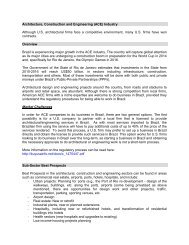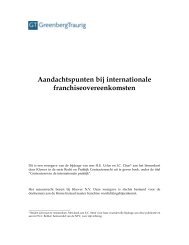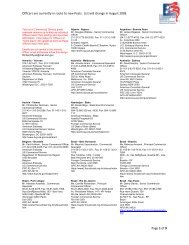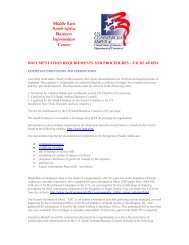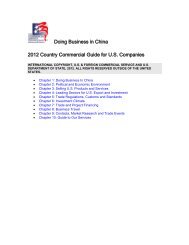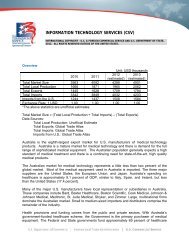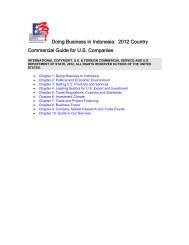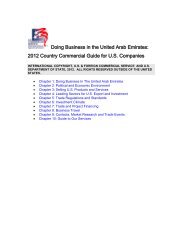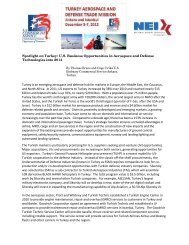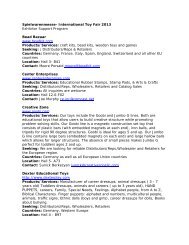2011 Bahrain Country Commercial Guide - US - Export.gov
2011 Bahrain Country Commercial Guide - US - Export.gov
2011 Bahrain Country Commercial Guide - US - Export.gov
Create successful ePaper yourself
Turn your PDF publications into a flip-book with our unique Google optimized e-Paper software.
Government has renewed the contract with CARS until April 2012. The Government‘s<br />
total investment in the public transportation privatization project has reached<br />
approximately <strong>US</strong>D 21 million.<br />
The Kingdom's first independent power plant project (IPP) was also successfully<br />
tendered and awarded to <strong>Bahrain</strong>i-based Al Ezzel Independent Power Producer (IPP),<br />
which is equally owned by a Belgian-Gulf consortium of Tractebel EGI and Gulf<br />
Investment Corporation. In 2006, the Government sold their biggest electrical plant Al<br />
Hidd Power Station for <strong>US</strong>D 728 Million to the consortium. In 2008, the Tender Board<br />
awarded a <strong>US</strong>D 2.2 billion contract to build a new electrical power plant in <strong>Bahrain</strong>—the<br />
Al Dur Water and Power Station—to Kuwait-based Gulf Investment Corporation(GIC)<br />
and France's GDF Suez. In September 2009 the Higher Commission of Electricity<br />
awarded a $240 million contract to General Electric purchase new gas turbines as part<br />
of a plan to expand the existing Al Dur Power Plant.<br />
In 2008, the Government founded the General Organization of Ports to oversee all port<br />
activities, including both marine and air. In 2006, Denmark‘s Muller was awarded a<br />
contract to manage Mina Salman and the new Mina Khalifa ports. The new port officially<br />
started operating in November 2009.<br />
In 2006 the <strong>Bahrain</strong> Monetary Agency transformed into the Central Bank of <strong>Bahrain</strong><br />
(CBB). Seeking to maintain <strong>Bahrain</strong>'s status as the Gulf region's preeminent financial<br />
center, the CBB changed its licensing practices in 2006 to give banks greater<br />
opportunities to invest domestically and regionally. The CBB has been active in<br />
developing regulations for the Islamic Banking sector, and has been instrumental in<br />
making <strong>Bahrain</strong> a recognized center of Islamic Banking.<br />
In January <strong>2011</strong>, the <strong>Bahrain</strong> Stock Exchange was transformed to a closed shareholding<br />
company. The newly-branded <strong>Bahrain</strong> Bourse is wholly owned by the GOB and<br />
regulated by the Central Bank of <strong>Bahrain</strong>. <strong>Bahrain</strong> Bourse now plans to increase its<br />
number of listed companies, boost share turnover and attract new domestic and foreign<br />
investors. The <strong>Bahrain</strong> Bourse allows GCC firms and GCC citizens to own up to 100<br />
percent of listed <strong>Bahrain</strong>i companies. Non-GCC firms/citizens may own up to 49 percent<br />
of listed <strong>Bahrain</strong>i companies, and 100 percent of foreign companies.<br />
In November <strong>2011</strong>, the Central Bank of <strong>Bahrain</strong> (CBB) announced that the banking<br />
sector is considered sound and stable, despite the ongoing civil & political unrest in<br />
<strong>Bahrain</strong> and the region. After urging by the CBB, Islamic banks have begun merging to<br />
create stronger entities, enhance competitiveness and allow the sector to overcome the<br />
financial crisis.<br />
In March 2004, as part of an effort to stimulate the insurance industry and reinforce<br />
<strong>Bahrain</strong>'s position as a major insurance center in the Middle East, the <strong>Bahrain</strong> Monetary<br />
Authority -- now the Central Bank of <strong>Bahrain</strong> (CBB) -- loosened ownership restrictions.<br />
Insurance firms, which were previously required to have at least 51 percent <strong>Bahrain</strong>iownership,<br />
are now permitted to operate with 100 percent foreign-ownership. The CBB<br />
is holding consultations on further reform in areas such as captive insurance, solvency,<br />
business conduct, risk management and financial crime, enforcement, BMA reporting<br />
and public disclosure, intermediaries, and Islamic insurance. Taxation and import laws<br />
apply equally to <strong>Bahrain</strong>i and foreign-owned companies, and foreign investors must<br />
comply with the same requirements and legislation as local firms.<br />
62



